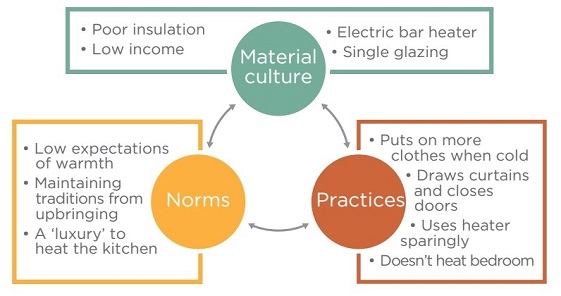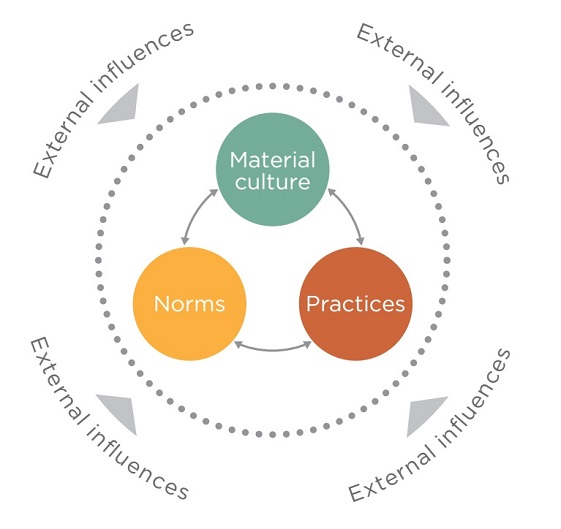Energy cultures
Why don’t businesses adopt energy-efficient technologies? Why do families under-heat their homes? Why are many New Zealanders keen on solar power? How can people be encouraged to buy electric vehicles?
Almost all energy issues have a behavioural component.
If energy behaviour is not well understood, the outcomes for New Zealand may be sub-optimal. For example, businesses may be less productive, families may get sick, energy companies may be unprepared for the level of uptake of photovoltaics, or the government’s EV targets may not be met.
Improving the understanding of energy behaviour is a challenge for New Zealand and internationally. People and businesses can get caught up in habitual behaviour patterns which can be hard to change. On the other hand, energy behaviour can change rapidly given the right circumstances.
Figure 1: The energy culture of ‘Mary’, a NZ householder.

Since the 1970s there have been numerous studies of energy-related behaviours from a wide range of disciplinary perspectives, including microeconomics; behavioural economics; technology adoption models; social and environmental psychology; and sociological theories. No single analytical approach provides a framework for analysing more than a small portion of behaviour, or for providing reliably successful interventions.
Against this background an interdisciplinary team of researchers centred on the University of Otago came together seeking to achieve an integrated understanding of household and business energy behaviours.
The initial group drew from consumer psychology, economics, sociology, law and engineering. In order to bring some coherence to their interactions and to the research programme as a whole, they developed a new theoretical model - the ‘Energy Cultures framework’.
The framework reflects how behaviour does not occur in isolation, but is strongly shaped by people or organisations’ material culture (their physical assets) and their norms (what they expect in life, or aspire to). These interactions form an ‘energy culture’ which can become strongly self-reinforcing, as with the example of Mary (Figure 1) and hard to change.
Energy cultures are also shaped by influences outside of the control of the household or business, such as laws, infrastructure, prices and policies (Figure 2).
Figure 2: the Energy Cultures framework.

The research of the Energy Cultures team (2009-2016) has identified energy cultures at many scales – from individuals and households to businesses and societal groups, and has also been used to investigate mobility cultures.
While it was initially developed to depict the nature of the problem, the framework has proven to be unexpectedly fruitful in supporting collaboration, designing research programme, supporting analysis, and helping identify opportunities for policy intervention.
The development of the Energy Cultures framework has led to its widespread adoption in New Zealand and internationally as a way of understanding energy behaviour. Applications in New Zealand have included investigations into fuel poverty, changing youth mobility, and contributions to electric vehicle policy. The current focus is on household appetite for new grid-connected technologies as part of the Green Grid project.
